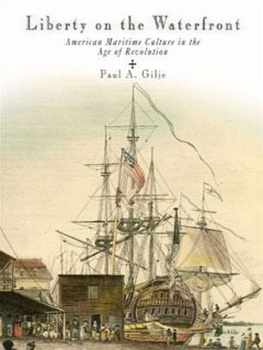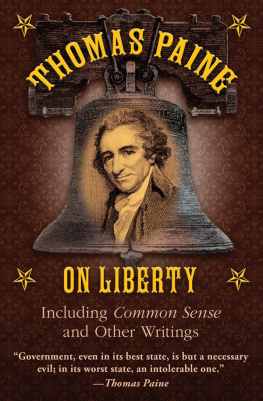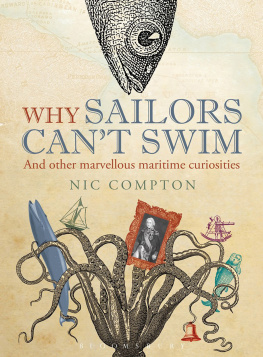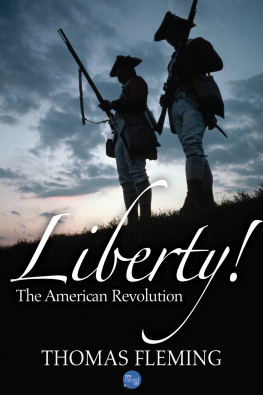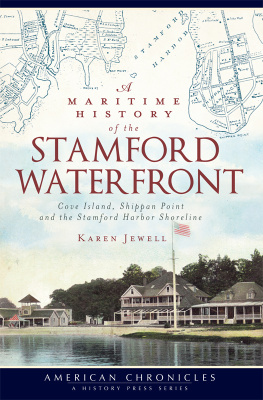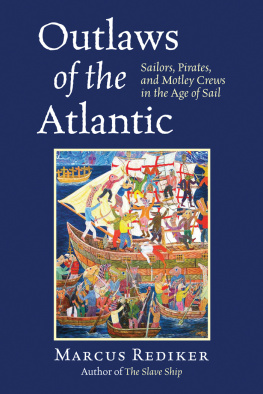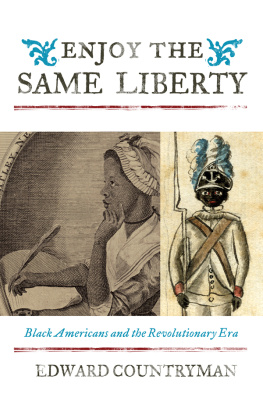Acknowledgments
Over the years that I have worked on this project I have been repeatedly asked how I could write on a maritime subject while living in a land locked state. The answer is simple: with a lot of help from my friendsinstitutions, libraries, and people. I began research in earnest on this project as a Rockefeller Resident Fellow at the program of Atlantic History and Culture at Johns Hopkins University in 198788. I also held a fellowship in the spring of 1991 at the Center for the History of Freedom, Washington University, St. Louis, under the directorship of Richard Davis. My work has been enhanced by funding from the Massachusetts Historical Society, the Peabody Essex Museum, a Summer Stipend from the National Endowment for the Humanities, and two grants from the Oklahoma Humanities Council. The University of Oklahoma has been incredibly generous in its support of my research, providing at least eight separate grants for this project as well as time off and course releases. I would like to particularly thank Deans Paul Bell and Roland Lehr of the College of Arts and Sciences, and Vice Presidents for Research Lee Williams and Eddie Smith for their ongoing support. I am also grateful to the Samuel Roberts Noble Foundation and to President David Boren of the University of Oklahoma for a Samuel Roberts Noble Foundation Presidential Professorship.
I have had the opportunity to present some of my research and findings in publication and as papers. I have incorporated in this volume portions of Liberty and Loyalty: The Ambiguous Patriotism of Jack Tar in the American Revolution, Pennsylvania History, 67 (2000), 16593; On the Waterfront: Maritime Workers in New York City in the Early Republic, 18001850, New York History, 77 (1996), 395426; The Extent of Freedom for American Waterfront Workers in the Age of Revolution, in David Konig, ed., Possessing Liberty: The Conditions of Freedom in the New American Republic, volume 5, History of Freedom (Stanford, Calif.: Stanford University Press and the Center for the History of Freedom, Washington University, St. Louis, 1995), 10940. I appreciate the willingness of these publishers to permit me to include material from these essays in this book. I offer a special thanks to Robyn McMillen who traced the ownership of the illustration on the frontpiece and the back cover and to Nick West for permission to use this picture.
I gratefully acknowledge all of the many comments I have received at the numerous institutions where I have presented papers on this subject, including the program of Atlantic History, Culture, and Society at Johns Hopkins University, the Philadelphia Center of Early American History and Culture, Center for the History of Freedom, Washington University, St. Louis, the Virginia Society of Cincinnati at Washington and Lee University, the Rothermere American Institute, Oxford University, Florida International University, University of Glasgow, University of Edinburgh, Peabody Essex Museum, and Massachusetts Historical Society. I presented some preliminary thoughts on the project at the Organization of American Historians meeting in New York City in 1986, and more developed ideas at the conference of the Omohundro Institute of Early American History and Culture at the University of Glasgow in 2001.
A quick look at the notes will indicate the many debts I owe to libraries. My greatest debt is to the University of Oklahoma Library, especially to its interlibrary loan staff, which managed to obtain more old books than I could have imagined. I also thank the libraries at Washington University and Johns Hopkins University during my sojourns at those institutions. The core of my research was in manuscripts at a number of libraries and historical societies. I am deeply indebted to the exceptional staffs of the following institutions: the Beinecke Rare Book and Manuscript Library at Yale University, Center for Maine History, Columbia University Library, Connecticut Historical Society, the G. W. Blunt White Library at Mystic Seaport, the Historical Society of Pennsylvania, the Kendall Whaling Museum, the Library of Congress, the Marblehead Historical Society, the Maryland Historical Society, the Massachusetts Historical Society, the Nantucket Historical Association, the National Archives in New York and Washington, D.C., the New Bedford Free Public Library, the New Hampshire Historical Society, the New-York Historical Society, the New York Public Library, the Old Dartmouth Histor-ical Society at the New Bedford Whaling Museum (now the Kendall Institute, New Bedford Whaling Museum), the Peabody Essex Museum, and the Rhode Island Historical Society. I want to especially thank a few individuals whose guidance in their archives was invaluable, including Kelly Drake at Mystic Seaport, Peter Drummey at the MHS, Michael P. Dyer at the Kendall, Betsy Lowenstein at Nantucket, Tina Furtado at the New Bedford Free Public Library, Candace B. McKinniss at the New Hampshire Historical Society, Judith Downey at the Old Dartmouth Historical Society, Rick Stattler at the Rhode Island Historical Society, and William T. La Moy, Kathy Flynn, Charity Galbreath, and Irene Axelrod at the Peabody Essex Museum.
The notes also only begin to suggest the debt I owe to the many historians who have gone before me. Although I disagree with their conclusions, and they with mine, without the work of Jesse Lemisch and Marcus Rediker, I might not have ever written this book. I also owe a tremendous debt to the published research of a talented group of maritime historians whose own work I relied on more than the notes suggest. Foremost among this group are Jeff Bolster, Margaret Creighton, Ira Dye, Christopher Mckee, and Daniel Vickers.
Several individuals have generously commented on various parts of this manuscript, including Betsy Blackmar, Cathy Brown, Elaine Foreman Crane, Cathy Kelly, John Larson, Simon Newman, and Lisa Norling. My friends Bill Pencak and Frank Cogliano read the entire manuscript and provided much needed advice. Since my semester in St. Louis I have obtained fellowship (not the money kind) and encouragement from my amigos Peter Onuf, Alan Taylor, Jan Lewis, and David Konig. I am grateful to Howard Rock, my sometime collaborator, whose continued friendship has been important to me for over twenty years. At the University of Oklahoma I have many supportive colleagues, none more so than Robert Griswold, who on the Great Plains has heard more about sailors than he thought possible and who as the chair of the history department has supported this project in more ways than I can recount. I must also acknowledge the staff of the Department of HistoryBarbara Million, Rhonda George, and Suzi Goerlachfor a thousand kindnesses that have made my life easier and have facilitated the writing of this book.
I owe a heartfelt thanks to Dan Richter for his comments on the manuscript, and to Bob Lockhart and the University of Pennsylvania Press for their enthusiasm for the book. I must also say thank you to Noreen O'Connor for her careful sharpening of my prose as my copyeditor.
Although I have never sailed upon the ocean, I grew up in Brooklyn less than a mile from the sea. The maritime world was all around me. When I was little we had boarders in our house who were Norwegian seamen. My father's best friends had all been to sea, and I remember visiting some of their ships as a young boy. I had an uncle who worked his way to become a captain on a tanker. I will never forget when another uncle, Gerry Rottingen, who served aboard a whaler as a young man and tried his hand in lobstering as he moved toward retirement, told my family of his youthful experience in the South Atlantic in the 1930s. My fondest memories of my father-in-law, Karl Liebermann, are of his relating stories about serving in the Norwegian navy and sailing the world over aboard an oil tanker. I suspect that I could not have written this book without this background, and I must acknowledge a debt to this vicarious exposure to a more recent maritime culture.
Next page
